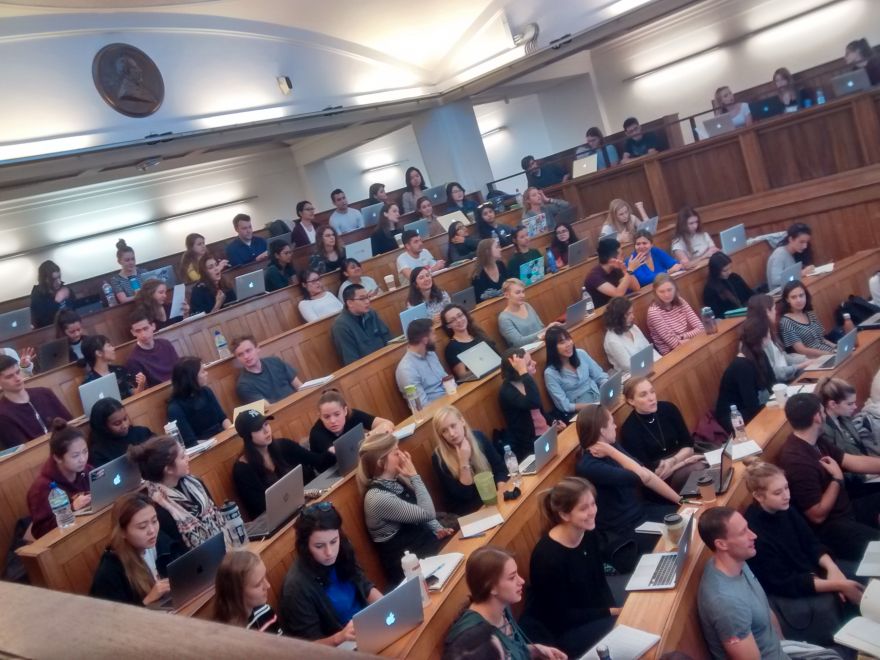A new multidisciplinary MSc in Behaviour Change has been launched this autumn at University College London. The first intake of 36 students will be introduced to cutting edge methods, theory and evidence relevant to changing behavior to address the societal problems we face.
Students
50% of the students are from the UK, with 50% from Europe, Australia, South America, Russia, China and the US. Background disciplines including Psychology, Business studies, Economics, Criminology, History, Philosophy, Education and Policy. The students bring a rich range of previous experience. For example, Kerim Tasangil says,
‘I worked for 12 years as an associate Director for Swiss Investment Bank in Foreign Exchange system analysis. I agreed to accept a voluntary redundancy in 2013, which enabled me to start my MSc degree. Both my academic and professional background as well as my life experience (I am 44 now) will be very beneficial to meet the high demands of this programme.’
While Sterling Rippy has come from an applied behaviour change background,
‘I've worked in a behavior change setting at the individual level through therapy with children with autism, tutoring sessions with undergraduate students, and in research studies increasing physical activity levels in sedentary individuals. These experiences led me to desire a further understanding of the concepts behind effective and evidence-based interventions in a variety of settings, and not just with individuals but at the societal level as well. I wanted learn more about applying the theoretical findings in behavioral science into real world, large-group settings and that's what led me to find the centre for behaviour change and thus, the MSc program.’
Modules
The course, led by co-Directors Professor Susan Michie and Leslie Gutman, has four core and four of 12 elective modules to allow each student to individually tailor their degree. Modules include intervention design and evaluation, consumer behaviour, public policy, transport, health, and energy use.
The Modules ‘Changing Behaviour: Intervention Development and Evaluation’, and ‘Behaviour Change: An Interdisciplinary Approach’ are core modules that focus on the cross-disciplinary thinking needed for behaviour change. Students are learning how to apply the evidence-based frameworks of the Behaviour Change Wheel (www.ncbi.nlm.nih.gov/pmc/articles/PMC3096582/) and the Behaviour Change Technique Taxonomy v1 to develop and evaluate behavior change interventions. The core module, 'Theories and Models of Behaviour Change' looks at why, when and how a behaviour does or does not occur, and how to use that knowledge to bring about change. 'Research methods and Evidence for Global Health' involves lectures on research study designs, statistical methods, qualitative research methods, and critical appraisal techniques to help prepare the students for their empirical research project.
‘Behaviour change: Health and Wellbeing’ focuses on evidence, methods and theory in relation to changing and maintaining behaviours relevant to health and wellbeing. ‘Transport Behaviour Change: Theory and Practice’ looks at current research, principles and practice in changing transport-related behaviour. ‘The Social Psychology of Risk’ focuses on the forces that shape lay responses to health risks, including behaviour change in the face of such risks. ‘Human Factors for Digital Health’ introduces the particular issues that relate to the design and evaluation of digital health technologies.
Progress so far
Jameson Daines has said the course is going well,
‘The course itself has been an enjoyable adventure. The professors come from a wide range of disciplines and conduct world leading research. Most modules have seminars that facilitate hands-on experiences with applying the content from the course. Personal tutors are assigned to each student to provide feedback and assistance. The students are from all over the world, creating a rich environment to learn and understand different perspectives.’
Senior teaching fellow, Danielle D'Lima has also said that the course is progressing positively,
‘I am very much enjoying my role as Senior Teaching Fellow for the MSc Behaviour Change. It is great working with such a diverse range of students to explore, discuss and contribute to the development of behaviour change as an applied academic discipline. The students are extremely enthusiastic and passionate which makes for very interesting discussions. Both the formal and informal interactions that I have with students are extremely motivating for me as an academic and support me in the conceptualisation and development of my own research agenda’.
Career paths
Careers being considered by students include health professionals, policy officers, researchers and research managers, IT developers, and urban and transport planners and behavioural ‘insight’ posts in the commercial sector. The current cohort have high career ambitions. Jameson Daines said,
‘After the course I plan to pursue a varied career in researching, applying, and consulting on behavioural science with organisations in the public and private sector. Along with seeking new opportunities, I have two existing projects that I plan to continue to develop after the program. Curve Behaviour Design is a project that integrates behavioural science with design thinking to drive innovation. Lissn is my startup that will be the first integrated system for the early detection and intervention of mental illness in youth.’
Find out more
The course webpage will soon be updated with information on enrolment for 2018/19 entry later this year - watch this space to find out how to apply.
Visit the programme website for more information - Behaviour Change MSc Webpage
23 November 2017



